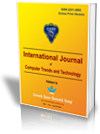Hybrid Learning Style and Learning Preference to Explore New Learners' Feature

Yu Hsin Hung , Chun Fu Lin , Ray I Chang."Hybrid Learning Style and Learning Preference to Explore New Learners' Feature". International Journal of Computer Trends and Technology (IJCTT) V13(1):6-9, July 2014. ISSN:2231-2803. www.ijcttjournal.org. Published by Seventh Sense Research Group.
Abstract -
personalized learning can detect feature of learners to provide different assistant for individual learner. Learning style is an important feature for learners that reflect the pattern of learners in in learning situations. In this study, learning style and learning preference were be analysed to find new learning feature of learners. 94 participants were invited in this study. Analysis results show that: learning preferences and learning styles has significant differences in statistical tests.
References
[1] Lin, C. F., Hung, Y. H., Chang, R. I., & Hung, S. H. (2014). Developing a problem-solving learning system to assess the effects of different materials on learning performance and attitudes. Computers & Education, 77, 50-66.
[2] Soloman, B. A., & Felder, R. M. (2001). Index of Learning Styles Questionnaire. Retrieved August 4, 2011, from North Carolina State University, http://www.engr.ncsu.edu/learningstyles/ilsweb.html.
[3] Hwang, G. J., Sung, H. Y., Hung, C. M., & Huang, I. (2013). A Learning Style Perspective to Investigate the Necessity of Developing Adaptive Learning Systems. Educational Technology & Society, 16(2), 188-197.
[4] Lin, C. F., Hung, Y. H., Chang, R. I., “Effect Analysis of a Multi-Material Approach to a Problem-Solving Learning System,” Journal of Computer Trends and Technology, 4(5), pp. 1450-1456, 2013.
[5] Lin, C. F., Hung, Y. H., Chang, R. I., “Analyzing the Effects of Different Multimedia Materials on Learning System,” Journal of Engineering Trends and Technology, 4(5), pp. 2145-2150, 2013.
[6] Hung, Y. H., Lin, C. F., “Developing a digital game-based learning system on insight problem solving,” Journal of computer& Organization Trends, 3(10), 2013.
[7] Nam, C. W., & Zellner, R. D. (2011). The relative effects of positive interdependence and group processing on student achievement and attitude in online cooperative learning. Computers & Education, 56(3), 680-688.
[9] Query-based learning. (2014). Retrieved July 1, 2014, from, http://www.springerreference.com/docs/html/chapterdbid/179400.html.
[10] Feldman, J., Monteserin, A., & Amandi, A. (2014). Detecting students' perception style by using games. Computers & Education, 71, 14-22.
[11] Romero, C., Ventura, S., & García, E. (2008). Data mining in course management systems: Moodle case study and tutorial. Computers & Education, 51(1), 368-384.
[12] Hwang, G. J., & Chang, H. F. (2011). A formative assessment-based mobile learning approach to improving the learning attitudes and achievements of students. Computers & Education, 56(1), 1023-1031.
Keywords
learning style, learning preference, personalized learning.


